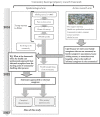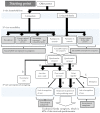Inaccessibility, unresponsiveness, inconsistency, and invisibility of informal caregivers of older persons with cognitive impairment: community-based participatory research
- PMID: 38057710
- PMCID: PMC10702127
- DOI: 10.1186/s12877-023-04542-5
Inaccessibility, unresponsiveness, inconsistency, and invisibility of informal caregivers of older persons with cognitive impairment: community-based participatory research
Abstract
Background: Studies on informal caregivers in Japan have been limited to family caregivers and largely conducted where family caregivers generally gather. Family caregivers who do not visit such places or non-family caregivers are generally overlooked, and data on these informal caregivers remains scant. Consequently, a framework is needed through which healthcare professionals can approach the informal caregivers of community-dwelling older persons. Therefore, this study approaches such informal caregivers and proposes a classification system for them from the starting point of older persons living in the community with cognitive impairment.
Methods: In 2016, we conducted an epidemiological survey of 7000 + community-dwelling older persons and identified 198 residents with Mini-mental state examination scores less than 23. A team of healthcare professionals contacted them regularly. By 2022, 92 people were still living in the community, and we systematically asked them about their informal caregivers. After approaching the caregivers and obtaining informed consent, we mailed separate questionnaires to older persons and informal caregivers.
Results: Among the caregivers, 59%, 34%, and 3% were the child, spouse, and sibling of the older person, while the remaining 4% were non-family caregivers. Except for two daughters-in-laws, all children were biological children of the older person. Male caregivers (46%) tended to have full-time jobs, whereas female caregivers (54%) tended to face financial difficulties. Only 3% of the caregivers had joined a family caregivers' association. Caregivers' reason for not joining such organizations was a lack of time and knowledge. A 3-tiered classification system was developed for these informal caregivers: (1) the household form, (2) accessibility, and (3) the reciprocal awareness of caregiving. Furthermore, family caregivers who lived with the older person or visited them more than once a week with reciprocal awareness of caring and being cared, or "traditional caregivers," accounted for 68% of the caregivers in this study.
Conclusion: Core family caregivers can be easily approached at places where such caregivers generally gather. However, there also exists a group of informal caregivers who are sometimes inaccessible, unresponsive, and invisible to healthcare professionals. Moreover, their awareness of caregiving is sometimes inconsistent.
Keywords: Caregivers; Cognitive impairment; Family caregiver; Informal caregiver; Japan; Older persons; Traditional caregiver.
© 2023. The Author(s).
Conflict of interest statement
The authors declare that they have no competing interests.
Figures
References
-
- Lindeza P, Rodrigues M, Costa J, Guerreiro M, Rosa MM. Impact of dementia on informal care: A systematic review of family caregivers’ perceptions. BMJ Support Palliat Care. 2020 Oct 14. 10.1136/bmjspcare-2020-002242. Epub ahead of print. PMID: 33055092. - PubMed
-
- Health and Global Policy Institute. Long-term care insurance. Japan Health Policy Now. https://japanhpn.org/en/longtermcare/ Accessed 1 May 2023.
Publication types
MeSH terms
Grants and funding
LinkOut - more resources
Full Text Sources
Medical



